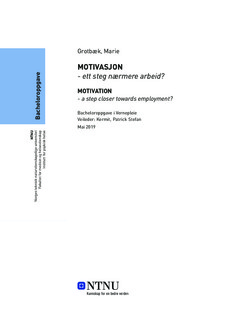MOTIVASJON - ett steg nærmere arbeid?
Bachelor thesis
Permanent lenke
http://hdl.handle.net/11250/2610653Utgivelsesdato
2019Metadata
Vis full innførselSamlinger
- Institutt for psykisk helse [1227]
Sammendrag
Introduksjon: De fleste personene med utviklingshemming arbeider ved kommunale aktivitetssentre eller dagtilbud, og svært få er i ordinært arbeid. Utviklingshemmede ser selv på arbeid som en viktig del av hverdagen, så vel som befolkningen for øvrig. Det vil med bakgrunn i dette være relevant å se på hvilke faktorer som motiverer personer med utviklingshemming til arbeid, for mulig økning og fokus på arbeid og deltakelse i samfunnet.
Hensikt:Hensikten med dette studiet var å finne studier som belyste hva personer med lett utviklingshemming anser som motiverende faktorer for arbeid. Dette gjennom analyse av fem utvalgte artikler.
Metode:En litteraturstudie ble benyttet som metode for dette studiet. Dette gjennom å systematisere og strukturere søk etter vitenskapelige artikler, og gjøre en analyse av dem for å besvare valgt problemstilling.
Resultater:Etter nøye analyse av utvalgte artikler var to hovedfaktorer fremtredende; indre og ytre motivasjon. Funnene viste faktorer som sosiale forhold og deltakelse, kompetanse, selvbestemmelse og anerkjennelse samt støtte var med å øke motivasjon for arbeid hos personer med lett utviklingshemming.
Konklusjon:Etter analyse av valgt litteratur er det flere faktorer som gir motivasjon til arbeid hos personer med lett utviklingshemming. Noen av de mest fremtredende faktorene handler om sosiale forhold og deltakelse i samfunnet og på arbeidsplassen, og å ha kompetanse, utvikle den videre og å bruke egne evner. Resultatene er påfallende normale, men likevel bør temaet motivasjon med fokus på personer med utviklingshemming utforskes videre. Introduction: Most people with intellectual disabilities work in sheltered centers, and a few are in integrated employment. People with intellectual disabilities consider work as an important part of their daily life, as well as the general population. Based on this, it will be relevant to investigate what type of factors motivate people with intellectual disabilities to work, for possible increase and focus on work and participation in society.
Aim/Purpose: The purpose of this study was to find studies that shed light on what people with mild intellectual disabilities consider as motivating factors for work. This through analysis of five selected articles.Methode A literature study was used as a method for this study. This by systematising and structured searches for scientific articles, and analyzing them to answer the thesis question.
Results:After careful analysis of selected articles, two main factors were prominent; intrinsic and incentive motivation. The findings showed that factors such as social conditions and participation, competence, self-determination, recognition and support was to increase motivation for work in people with mild intellectual disabilities.
Conclusion: After analysis of selected literature, there are several factors for motivation in people with mild developmental disabilities. Some of the most prominent are about social conditions and participation in society and in the workplace, and competence where the opportunity to develop further and use their own abilities is set high. The results are strikingly normal, but the topic of motivation with focus on people with intellectual disabilities should be further researched.
